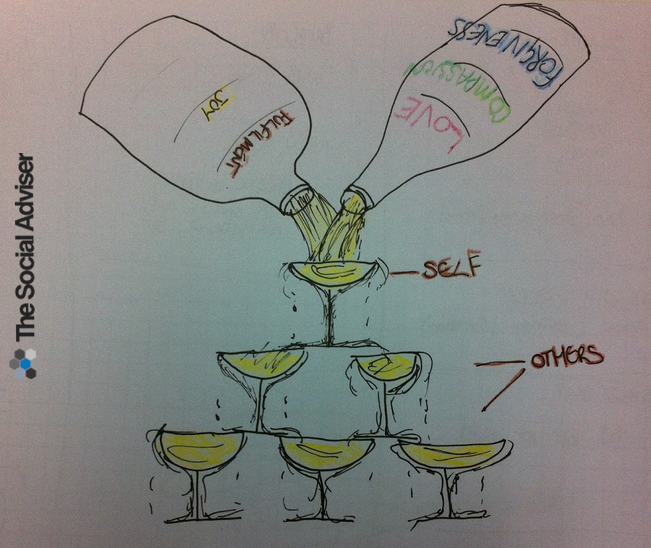Serving others will come naturally.
Selfishness was a concept drummed into me from a young age that meant doing anything for myself without the purpose or intention of it helping others was not acceptable—and it was certainly
not acceptable to put yourself before others in any capacity.
One of my default settings is to help others; it’s a passion. I enjoy seeing people achieve something they’ve had difficulty with that they couldn’t achieve on their own. I believe that collectively if we help each other more the world would have less of the common problems. When I set out to help others I’m happy that people achieve things that they find challenging, having breakthroughs and extending boundaries. But what followed throughout my life was detrimental to my health and personal well-being.
I found myself burning out more and not achieving anything for myself, whilst others accomplished what they set out to do. No matter how much I helped people I found there was less reciprocation to the level I’d helped them. I saw this as an inherited belief system that only certain kinds of people were entitled to and that I wasn’t one of them – I was not worthy. It was such self-destructive thoughts that caused me considerable angst and anguish during my late teens. My cup was dry.
By definition selfish means: (Of a person, action, or motive) lacking consideration for other people; concerned chiefly with one’s own personal profit or pleasure. Oxford Dictionaries online
Anything I’d ever done for only myself never lacked consideration for other people; yet I was led to feel that doing so was selfish and bad. Yet what’s so bad about doing some things concerned chiefly with one’s own personal pleasure, provided people aren’t being hurt? Fun and pleasure are so important for the soul.
The shift in thinking
It wasn’t until I had been practicing yoga for a few years that a new concept around helping people resonated with me more holistically and realistically: fill your own cup first, because the effect of this is that you overflow with your generosity, love, compassion, etc., that naturally fills up the cups of those around you. In turn, their cups overflow and fill those cups around them. If you’re emptying your cup to fill those around you, you’re constantly depleting your own reserves of energy, resources, etc., resulting in a dry cup and no more to give.
Why are you really helping?
I also learned to give without the expectation or desire to receive something in return. After all, why am I helping? Is it because I want the recognition? Or the affirmation that I’m a good, likeable person? This is selfish because it’s not for the right reasons: it’s not for the benefit of others but for myself. This is the ego asserting itself. By being me and helping others without attachment to the outcome or the recognition of anything in return, it serves others more authentically.
“Whatever ingredient you need to give to others, you must first give it to yourself.”
So if you’re finding it difficult to give yourself some love, you’re going to find it difficult to give love to others. Whatever ingredient you need to give to others, you must first give it to yourself.In effect, a little bit of selfishness goes a long way to serving others; whereas constantly depleting yourself of resources means that you’re not at your optimum level to serve others in the pursuit of doing more for more people. How ironic is that?
Here’s a simple exercise to help you on your way to serving others holistically and selflessly:
- 1. What is it that helps you to reset and re-energise? Out of a rating of 10 how much of this do you actually do in any given week? If you score below 5 in any area of importance, do more of this by indulging in what helps you to feel good about yourself, such as a long hot bath, going for a walk in the country, kayaking, etc.
- 2. It will be difficult, but make time in your busy schedule to do it. Before exclaiming the cries of time being against you consider this: if a friend asks you to go for a walk or go kayaking do you refuse? Or do you make the time, even if it’s a couple of weeks away? The best friend you have is yourself so make some time to spend with yourself.
- 3. Set up a regular time to do at least one of these things that fulfils you. Depending on how much time’s involved in your chosen activity, aim to do it at least once a week and start to feel the power of self-nurturing—guilt-free.
What’s your missing ingredient? Let us know how you go.

